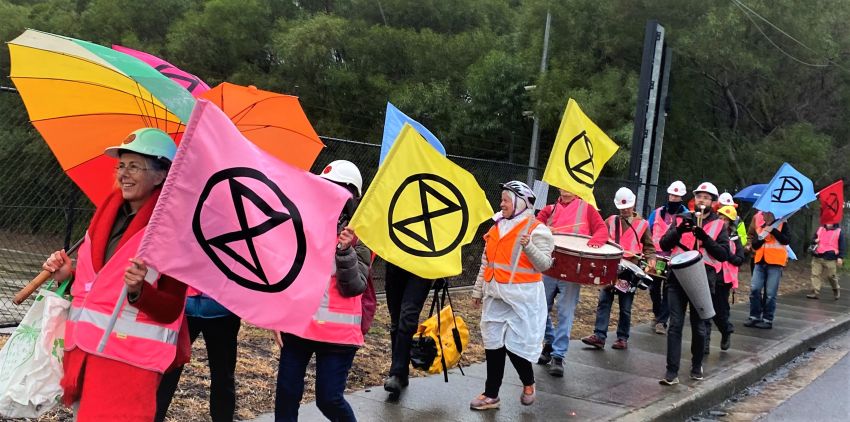
Extinction Rebellion (XR) activists closed the busy shipping terminal at Port Botany for four hours on June 10 as part of a national day of action against fossil fuels.
The action aimed to block liquid fuel tankers for two hours, but succeeded in shutting down all truck movements for four hours. On average, 200 trucks leave the terminal every hour.
XR is calling on the federal government to stop subsidising liquid fossil fuels and to accelerate the transition to electrify all transport.
Paul Osborn told Green Left that the federal government is spending $600 million on a gas-fired power station “which we don’t need” in Kurri Kurri, and is pushing ahead with fracking unconventional gas “which could damage the Great Artesian Basin”.
“We can transition to green jobs, easily,” said Osborn. He said the government should stop subsidising $10.3 billion in fuel excise for the fossil fuel industry to “properly paid green jobs”.
XR activist Fran Fagan told Green Left: “The government doesn’t have a plan to deal with the environment crisis apart from its gas-led recovery which will make it worse.”
XR activist Richard Boult told Green Left: “We stopped a few gas tankers, fuel tankers, because the government’s proposal for 100% renewables by 2050 is too late.” He said serious work needed to be done to avert the climate catastrophe in the next 5 years.
“We need negligible emissions by 2030, at least. The port workers want the transition to start now. They want a proper plan for change in the fuel depot in the next 10 years.”
Boult said the port facilities could be used to export green hydrogen, powered by offshore wind farms. “Green hydrogen could also be used for domestic use, made by the same workers”, so they would not be left unemployed.
Maritime Union of Australia Sydney Branch Secretary Paul Keating backed the XR action saying: “All fuel used in NSW is imported by sea. Just like every other job in carbon-intensive industries, we must take action now and plan a future for these workers in low-emission jobs.
"We cannot afford to just wait for these jobs to disappear from under these workers as the economy changes around us.”